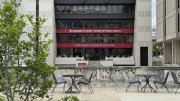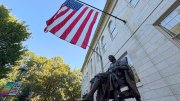A federal judge this week ordered the National Institutes of Health (NIH) to restore at least 800 terminated research grants that had been issued to institutions across the country. Calling the terminations “illegal” and “void” during a two-hour hearing in Boston, U.S. District Judge William G. Young handed scientists a victory in the fight over federal research funding—although it is likely that only a fraction of Harvard’s cancelled grants will be directly affected by the decision.
The judge’s ruling, which the government is likely to appeal, combines two lawsuits against the Trump administration and the NIH over grants focusing on racial and gender disparities in healthcare and vaccine hesitancy. Those grants were terminated by a series of anti-DEI executive orders signed by President Donald Trump in January.
One lawsuit was filed in early April by the American Public Health Association, along with a group of other organizations and researchers, including Harvard epidemiologist Brittany Charlton, an associate professor in the T.H. Chan School of Public Health (HSPH). Charlton studies health inequities for sexual and gender minorities, especially in cancer and reproductive care, and leads the LGBTQ Health Center of Excellence, founded in 2024. Five of Charlton’s federal grants were terminated.
Also in early April, a group of attorneys general from 16 states, including Massachusetts, filed a second lawsuit.
Scott Delaney, a HSPH research scientist who launched the Grant Watch database earlier this spring to document the growing cuts to NIH and National Science Foundation research, attended Monday’s hearing by phone. He called Young’s ruling “a powerful statement,” although he added that only a small number of Harvard’s cancelled grants are likely included in these lawsuits.
Instead, the vast majority of the 1,000-plus grants and contracts that Harvard has lost were terminated by orders targeting the University directly, rather than by Trump’s assault on what he calls “DEI research.”
Still, Delaney said, the ruling offers a positive sign for Harvard’s own lawsuit seeking to overturn the Trump administration’s funding cancellations. An expedited trial in that case is set to begin on July 21 before U.S. District Judge Allison Burroughs.
Young “was very clear that he thought the government's actions were unlawful in multiple ways,” Delaney said. “And he was very angry about it. I think it sent the clear message that courts are not going to tolerate the unlawful attacks on American scientific research and on American health generally. And look, you know, the government’s terminations of grants at Harvard are not any less unlawful.”
Delaney, who worked as an attorney for several years before returning to graduate school to study epidemiology (earning a Harvard Ph.D. in 2019), described Monday’s court proceedings as “jaw-dropping.”
“I've never seen a hearing go down like that,” he said. “I've never seen a judge make statements like that.”
A Boston Globe report quoted Young, a Reagan appointee, as saying, “I’ve sat on this bench now for 40 years. I’ve never seen government racial discrimination like this.”
Meanwhile, as the government’s funding freeze has ground much of Harvard’s medical and public health research to a halt, STAT News reported on Monday that İş Private Equity, a Turkish company, had committed $39 million to a laboratory run by Gökhan Hotamışlıgil, the Simmons professor of genetics and metabolism at HSPH. Hotamışlıgil, whose work investigates how metabolic and immune responses interact to cause disease, studies illnesses such as obesity, diabetes, fatty liver disease, and lung and cardiovascular diseases.
The private equity deal, which also includes investments of an “undisclosed amount” in drug candidates that emerge from Hotamışlıgil’s research, predated the federal government’s pullback of research funding—talks began last year, STAT reports, during a trip the professor took to Turkey, his home country. But the announcement comes at a time when Harvard researchers—especially at HSPH, which relies on the federal government for more than half of its funding—have begun brainstorming new ways to fund their work.









